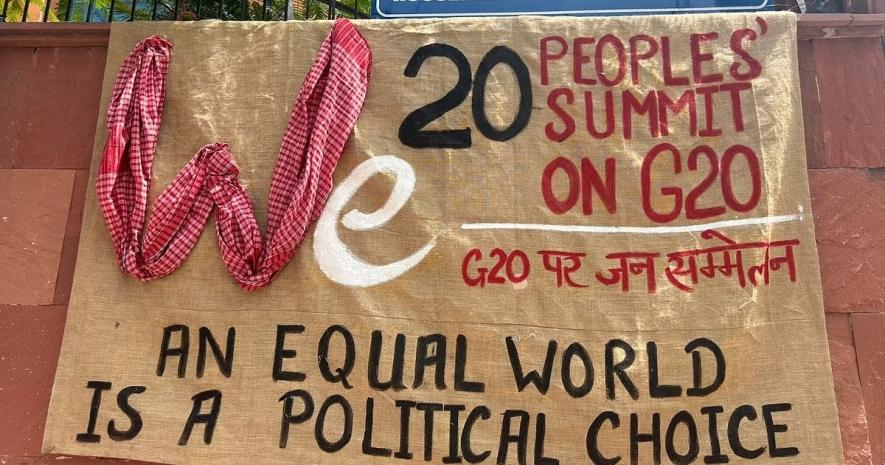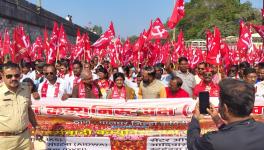We20 Activists Stand Firm Against Blockade by Delhi Police Trained For Modi’s G-20

Image Courtesy : Working Group on International Finance Institutions
Activists of all kinds and descriptions one in a wheelchair, dozens from the National Hawkers Federation, a galaxy of male and female people’s movement leaders braved attempts by the Delhi Police to block and shut down a three day We20 gathering at the CPI-M’s HKS Surjeet Bhawan in the DDU Marg institutional area on August 19, the second day of the three-day We20 Peoples’ Summit, which was demanding that the rich and aspirational countries put people above profits.
The inaugural day on August 18 had gone without incident, with addresses by Teesta Setalvad, Rajeev Gowda, Manoj Jha, Medha Patkar, Franco Thomas, Vandana Shiva and others. However by 11.45 a.m the morning of Saturday, August 19, a repressive police force arrived at the gates preventing exit or entry by participants. Police, clad in camouflage fatigues and trained for the G-20 summit Prime Minister Narendra Modi will preside over in September – had barricaded the gates and those who were participating in or attending the event.
Dozens of the 700 delegates representing 70 organisations were staying in the building, owned by the Communist Party of India (Marxist). However, others– including Vandana Shiva, Annie Raja, and Jairam Ramesh – did find their way in. .
Even while policemen swarmed the iron gates, CPI’s Annie Raja gave a fiery speech condemning the police siege of the building. Medha Patkar remarked, “This is not the end. We need to continue these struggles at the level of villages and towns, and give voice to the issues of the people.”
Thomas Franco from People First said, “Article 19 (1) of the constitution provides for freedom of speech and freedom of expression. No law prevents people from gathering for a peaceful discussion. We condemn the BJP government, who are trying to take away the rights of the people.” Shaktiman Ghosh of the National Hawkers’ Federation condemned the police action and added that “we will fight against these fascist trends, come what may.”
With police at the gates, the community cultural and intellectual gathering went on. The ground floor saw stalls of political and economic literature, the works of Ambedkar, stalls of Khadi clothes, handbags and paintings, and on-the-spot work by young artists.
The organisers finally decided to cut short the proceedings of the third day. The many delegates staying in the building left for home on August 20, but not before passing the We20 Declaration.
The failures of the Modi government and the G20
In the sessions on the first two days, economists, political scientists and civil society leaders spoke on crucial issues especially related to the hype and personal propaganda squeezed out of the G20 summit by the regime in New Delhi, leadership of which was of a rotational nature. Next year, 2024 it is Fiji’s turn!
The first day, inaugural programme on August 18 had a panel of speakers including Brinda Karat, Manoj Jha, Harsh Mander, Arun Kumar, Hannan Mollah, Teesta Setalvad, Jayati Ghosh, Rajeev Gowda, among others.
The six workshops on the second day focussed on global finance, big banks, and their impact on people; the right to information; digital data and surveillance; and climate change. Jairam Ramesh, Vandana Shiva, Anjali Bhardwaj, Amrita Johri and Nikhil Dey were among the speakers.
India’s stumbling on democratic issues, the democratic deficit if you like was discussed at length, including freedom of speech and civil liberties, the plight of the people along the coastline, the exploitation of gig workers in the digital and app-based marketplaces, and assaults on freedom of religion and belief came up for detailed analysis. A young woman living and farming on the Yamuna riverbed, having been displaced multiple times, spoke of the human cost of the G20 summit as hutment dwellers have lost their homes to bulldozers which are “beautifying the capital”.
Almost every speaker questioned the massive public spending on the G20 preparations, with tens of crores spent on advertising alone, which centred on Modi alone. As economist Jayati Ghosh pointed out, the G20 summit remains an informal elite club, holding all its discussions behind closed doors, with no participation from the people who are affected by their decisions and recommendations. It is going to be less about the real concerns of the people and more of a prescription from the “masters”.
The declaration
The declaration released on the aborted third day of the session called “for solidarity and unity among all democratic forces, peoples’ movements, civil society organisations, human rights defenders and progressive individuals to demand robust South-South cooperation, and a just, inclusive, transparent and equitable future for people all over the world.”
The declaration also strongly condemned the erosion of democratic institutions and spaces; the attack on constitutional values, civil society groups, human rights defenders and academic bodies; the use of digital surveillance and data privacy; the dilution of laws related to the right to information; criminalisation of dissent; and much.
The declaration ‘People and Nature over Profits for a Just, Inclusive, Transparent and Equitable Future’ also condemned the police action while critically looking at the G20 and demanding the overhaul of the international financial architecture. It called out the “false market-based solutions” to the climate crisis proposed by the G20 which have resulted in the “financialisation of nature”, creating a crisis in communities dependent on natural resources. It rejected corporate capital’s capture of global food governance through the Agreement on Agriculture in the WTO, and emerging bilateral and multilateral trade agreements.
Get the latest reports & analysis with people's perspective on Protests, movements & deep analytical videos, discussions of the current affairs in your Telegram app. Subscribe to NewsClick's Telegram channel & get Real-Time updates on stories, as they get published on our website.
























